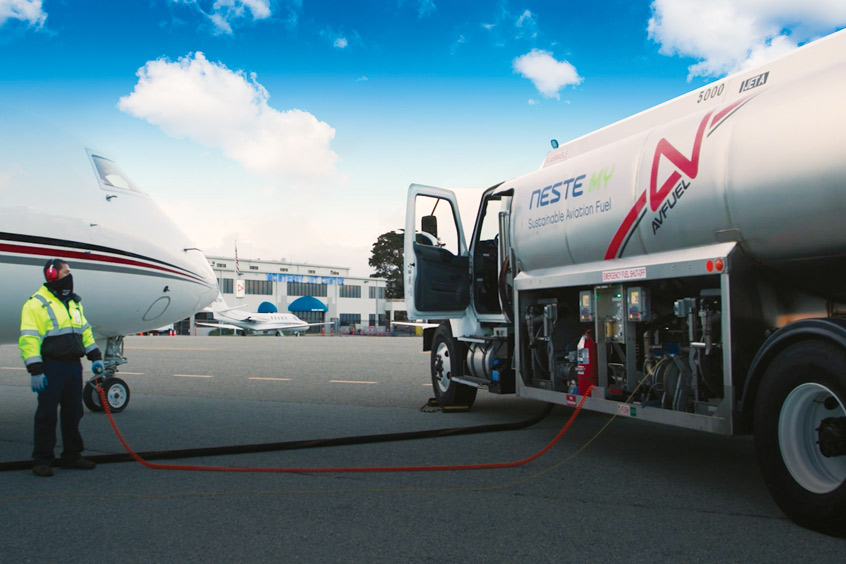Why visit ACE ’25?



Avfuel Corporation has made a formal commitment to sustainability, including a new mission statement and a pledge to offset emissions annually. It comes as Avfuel increases its number of locations offering SAF.
According to the fuel supplier, Avfuel is committed to identifying, developing, providing and advocating sustainable solutions. It says its duty is to promote environmentally responsible operations at its properties and throughout its network, in addition to facilitating initiatives to help customers reach their sustainability goals.
It will now offset all annual carbon emissions generated from scope 1 and 2 activities, such as energy used on Avfuel’s campuses and by company vehicles, including fuel burned by its own transport trucks for fuel deliveries; fuel used in corporate aircraft; and diesel used in leased refueller truck equipment across the Avfuel Network.
Avfuel will offset these emissions with carbon credits, helping to reduce its net carbon footprint. For 2020, this involves offsetting 8,164 metric tons of carbon emissions with carbon credits purchased through CBL Markets, its new carbon credit provider.
CBL Markets will help the fuel supplier with backend efficiencies for the programme, including sourcing green projects, carbon credit accreditation and certificate retiring.
“After careful consideration and numerous discussions with CBL Markets, Avfuel is excited to finally launch this new partnership,” says Muneeb Ahmed, Avfuel’s director of trading and logistics. “While the customer facing component of Avfuel’s carbon offset program will remain the same, our new partnership with CBL Markets will allow for greater efficiencies for a more robust offering.”
Avfuel’s carbon offset program is a voluntary sustainability solution; for a small additional per gallon fee, the programme helps operators reach net zero by purchasing carbon credits that invest in green projects. All projects it sources through CBL Markets have strict monitoring, verification and certification requirements to ensure full levels of due diligence and compliance, meeting either the Gold Standard, American Carbon Registry, Climate Action Reserve or Verified Carbon Standard.
It says every carbon credit offsets approximately 100 gallons of jet fuel. Credits are calculated using an industry standardised formula, measured in accordance with the Greenhouse Gas Protocol and the ISO 14064 Standard, and utilising carbon dioxide emission coefficients as assigned by the U.S. Energy Information Administration.
“At Avfuel, we recognise the responsibility we have, especially as a fuel supplier, to operate with a sustainable mindset,” says Marci Ammerman, Avfuel’s vice president of marketing. “After carefully reviewing the emissions we produce as a company with third party sustainability consultants, we felt it imperative to do our part in reducing our net carbon footprint.”
To further help realise its sustainability mission, Avfuel provides or is working toward a number of sustainability solutions in addition to its carbon offset program and offsetting pledge including bringing sustainable aviation fuel (SAF) and unleaded avgas to market and launching a book and claim offering for SAF.
With Avfuel’s book and claim programme, customers can buy a full load delivery of SAF and receive credit for the emissions reductions benefit it provides no matter where they are in relation to where the fuel is delivered.
“We’re thrilled to now make SAF more attainable for our customers worldwide,” says Keith Sawyer, Avfuel’s manager of alternative fuels. “Sustainable aviation fuel is the most effective way to reduce a flight’s carbon footprint, and book and claim is the single most effective way to make SAF attainable for customers no matter where they fly. SAF production is largely isolated to the western U.S. Trucking the fuel to the opposite end of the country where a customer may want SAF is not only less efficient and costlier, particularly given the truck driver shortage, but also affects the lifecycle emissions reduction benefit of SAF.”
With Avfuel’s book and claim programme, a customer can purchase SAF no matter where they’re located, paying the premium cost for SAF over jet fuel and in return receiving the credit for its use and applying it to their ESG scores. It is taken off the book at an airport where the physical SAF molecules are held and being uplifted by customers who are simply paying for jet fuel and do not get to claim credit toward using SAF in their ESG scores.
“It’s not unlike carbon offsetting whereby you can pay to invest in green projects and receive credit toward carbon emissions reductions,” adds Sawyer. “The difference is that emissions are being directly reduced by an operation through the use of SAF, rather than simply offsetting emissions that have already been produced.”
Avfuel’s book and claim programme is one of a number of sustainability solutions the fuel supplier offers or is working toward, in addition to SAF, a Carbon Offsetting Program, unleaded avgas and a pledge to offset its own emissions.